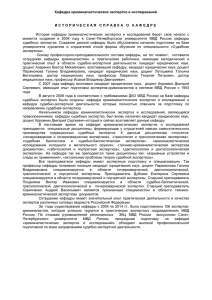Uchebnik Teoriya Sudebnoj Ekspertizi Er Rossinskaya Zinin
International legal regulation of cooperation in the electricity sector between member states of the Community of Independent States and the Eurasian Economic Union The research issue is focused on the general domain of the historical stages and prospects of forming a common electricity market in the states of the former Soviet Union space. The empirical part of the investigation covers international legal acts and instruments of activity of subjects of international law, taking into account characteristics of electricity as a commodity. The author gives a legal assessment of the current level of cooperation of the states - participants of the CIS in the sphere of electric power industry. Based on the comparison of the CIS experience and identified problems of international legal regulation in this area, the author considers the main elements of a common electricity market of the Eurasian Economic Union as a complex legal system related to the purchase and sale of electricity, the main ones are the subjects, technological and legal bases.

Teoriya otnositel'nosti v vuzovskom i shkol'nom kurse fiziki: Novye metody v obuchenii studentov i shkol'nikov elementam spetsial'noy i obshchey teorii otnositel'nosti (Russian Edition) [Aleksandr Khrustalyev] on Amazon.com. *FREE* shipping on qualifying offers.
The importance of the CSTO in strengthening of Russian-Tajik cooperation In the article the role and place of the CSTO in the framework of military-political cooperation between Russia and Tajikistan. The role of Tajikistan in the region from the point of view of security since joining the CSTO until the modern period. She also noted the priorities of the CSTO in the fight against new challenges and threats to security in the Central Asian region as international terrorism, drug trafficking, extremism, etc. In General, the article notes that the strengthening of Russian-Tajik military cooperation in the long term, coincidence plays the vital national interests of the two countries that influence the formation of regional security and stability in Central Asia. Chechevishnikov A. Mezhdunarodnaja konferencija «Central'naja Azija-Kaspij-Kavkaz: Mezhdunarodnoe politiko-jenergeticheskoe izmerenie» // V sbornike: Juzhnyj flang SNG. Aleksandrov O.
B., Ahtamzjan I. A., Barabanov O.

N., Bogaturov A. D., Bolgova I. V., Borovskij I. V., Vardanija G. I., Vardomskij L.
B., Grigor'eva Ju. G., Danilin I. V., Degoev V.
V., Zvjagel'skaja I. D., Kovach M., Kuz'mina E. M., Kurtov A. A., Luzjanin S. G., Malysheva D. B., Mal'gin A.
V., Mamedov Z., Narinskij M. Central'naja Azija - Kaspij - Kavkaz: jenergetika i politika.
Moskva, 2005. Arbitral award in the matter of the South China Sea arbitration (Philippines and China) on 12 July 2016, international reaction thereto and a commentary Abstract: The article contains a summary of the Award in the matter of the South China Sea arbitration on July 12, 2016 (the Philippines and China), in which the Court clarified the scope of the Convention's compulsory settlement system; defined the characteristics of historic waters; systematically described the regime of marine formations, etc. The Court endorsed almost all demands of the Philippines: it found that it had jurisdiction, didn’t confirmed the existence of the China's historic rights, didn’t recognized the island’s status of the South China Sea’s maritime formations, which would allow China to claim sovereignty over them and surrounding maritime spaces, and found that in some cases China had violated the Philippines’ rights. The article characterizes the international reaction to the Award, both from the parties to the dispute and third countries. Separately, the author discusses the possible impact of the Award on the Russia’s maritime rights. In the last part of the article the author casts doubt on some of the key conclusions of the Court and shows what could be an alternative logic. Universaljnij patch dlya 1s 83 pc.
Fact-finding creates informational base for the activities of the UN in the maintenance of international peace and security and legitimizes the decisions of its organs. Fact-finding missions are formed on an ad hoc basis. Their formation and operation is governed by the UN Charter and the resolutions of the General Assembly. They are initiated by the principal and subsidiary organs and specialized agencies. There is an upward trend of fact-finding missions initiated by the Human Rights Council, and the reverse trend in the practice of the Security Council. International legal problems of fisheries management in Baltic and Black seas The article describes the history of the emergence and content of the concept of a closed or semiclosed sea, its international legal regime. The norms of international regional agreements on fisheries in the Baltic and Black seas are analyzed in detail.